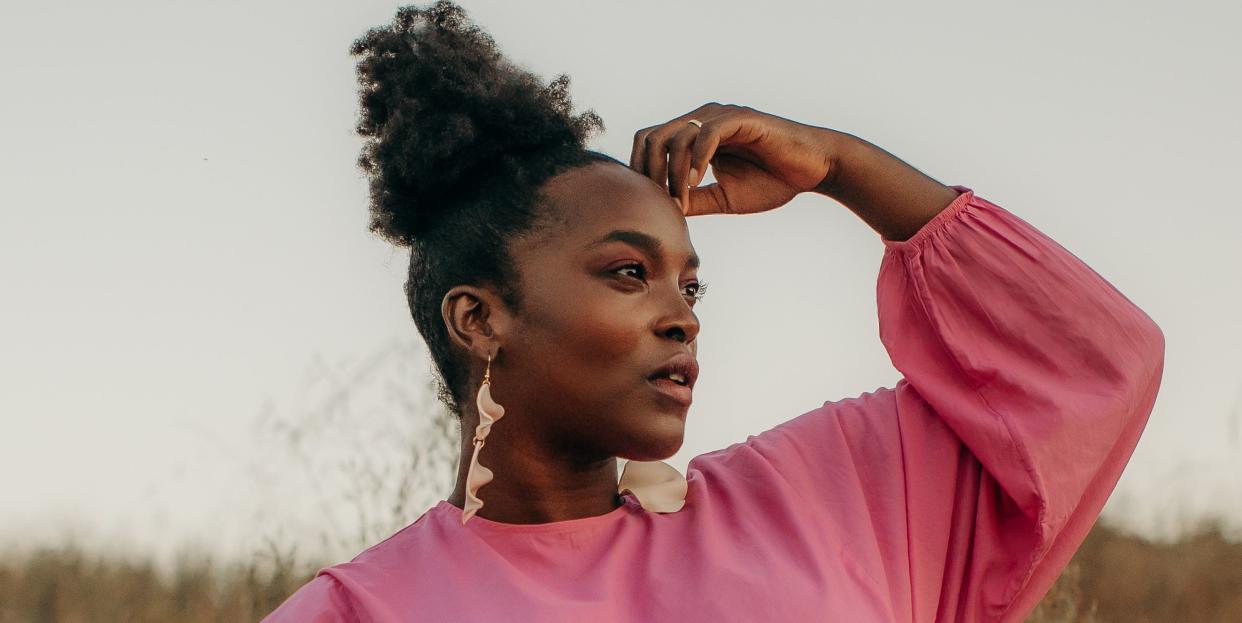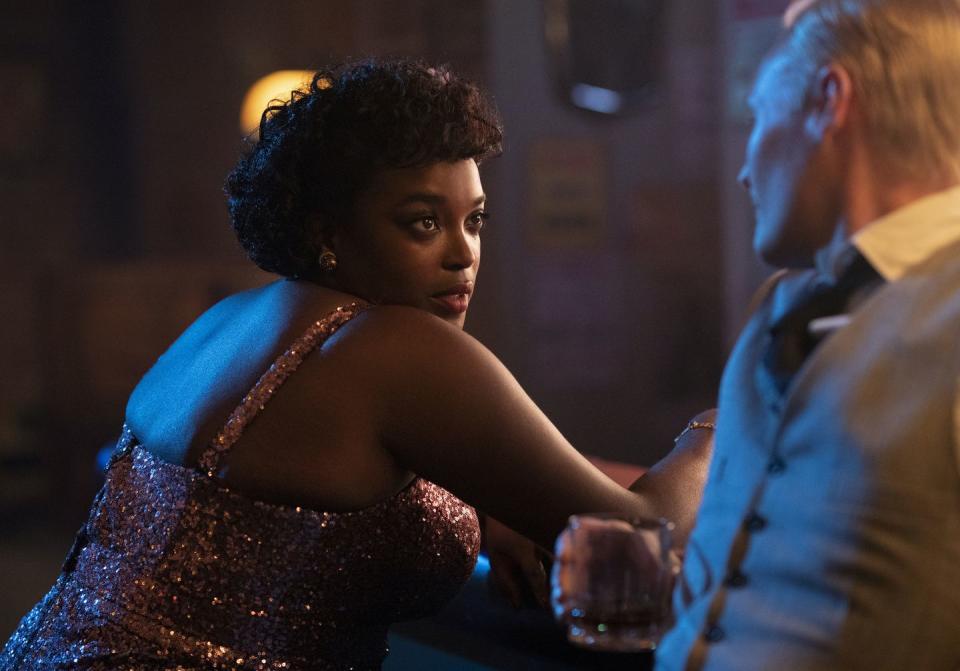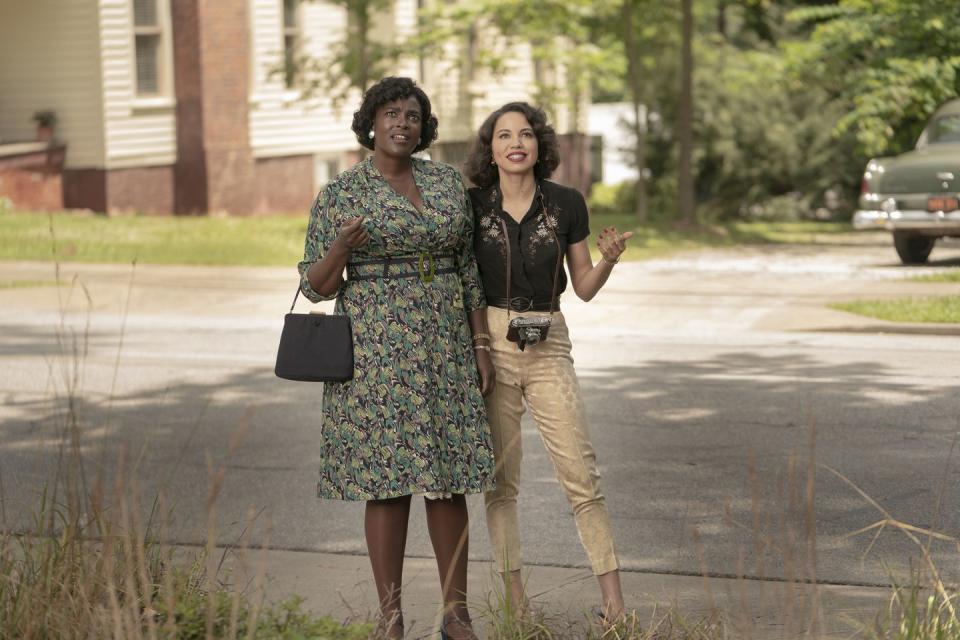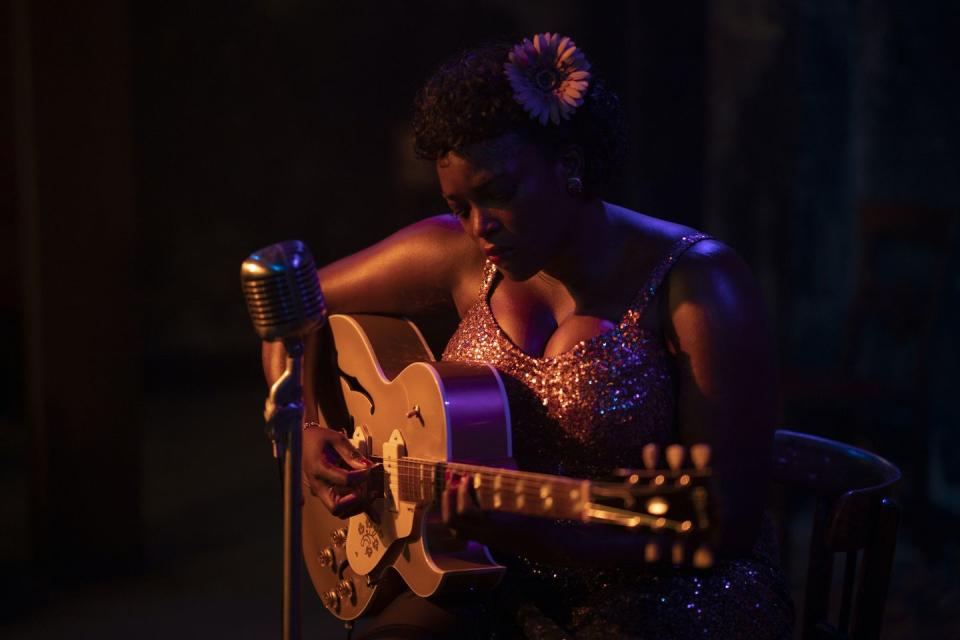Lovecraft Country's Wunmi Mosaku Thinks Ruby Wasted an Opportunity

As an actress, Wunmi Mosaku becomes other people for a living—but that hardly prepared her for playing Ruby Baptiste, Lovecraft Country's newly-minted shape-shifter.
"I was quite shocked when I was told about the character’s journey," she says of the show's very Ruby-centric fifth episode, in which her character is given a new body—a white body—to inhabit as she pleases. "I just thought it was an incredible thing to explore the idea of passing, but just on another level," Mosaku says, adding, "If I was to go around as a white woman, a white man, an Asian woman, an Asian man... the world would just respond to you so differently because of your outward form, right?"
Ruby lives out a classic thought experiment, moving through the world in someone else's skin. At first, she takes it slow, moving through the world with a newfound freedom and working her dream job; by the end, disgusted by the bigoted white people surrounding her and emboldened by her magic, she's defiling her boss with a stiletto.
Without a powerhouse performance at its center, the story might have been a little much. But Mosaku—a Nigerian-born British actress whose star is still on the rise, despite already winning a BAFTA—was more than up to the task.
Below, Mosaku offers her thoughts on the striking episode, Ruby's choice to embrace her rage (she's not a fan), and the challenges of learning the history that isn't taught in school.

Okay, so I want to dive right into episode five. What was it like to film those scenes where you're breaking out of another person's body? Is that just CGI? A lot of makeup?
It’s a lot of special effects. You’re also covered from head to toe in this gunk and blood—drenched hair, everything’s drenched.
They paint on the blood first and then they put this kind of jelly on top of you—but it dries out quickly, too, so they have to keep adding it on. You’re just covered head to toe in gunk. It’s really sticky and it’s really gross. You can’t really cover up, so you’ve got people making a tent around you, because to cover up you’d have to go through the process all over again. [Laughs] So it’s really wet and cold and gross. Jamie [Neumann, the actress who plays Ruby's white self] doesn’t get all of that, she doesn’t get the horrible stuff. Just me. [Laughs.] She was always clean at the end of the day, I’m always messed up.
What was it like to share a role with another actress?
It was amazing. She and I spent a lot of time together. Talked a lot about Ruby, about being Black in America. We were on set together a lot of the time, watching each other work. Jamie and I became really close.
I had to let her—you know, it’s not about her copying me. Ruby is in a new body, so it’s different, right? [Ruby doesn't] know how to move in this move in this body in the same way. So there’s a freedom that’s afforded there.
Do you think Ruby's better or worse off having had this experience?
I don’t know. I think she’s… I don’t know.
It seems like she's a little radicalized now.
She explores a side of her rage because she’s afforded a freedom that she doesn’t have as a Black woman. She explores a world without consequence. She’s got magic at her fingertips.
I don’t agree with what she’s done with that freedom. I can’t say that she’s better off for it. I don’t think revenge is necessarily a good emotion to explore, personally. It’s not okay, even if it is revenge. Even if you do feel justified. You know what I mean?

What would you have done?
I don’t agree with violence. I don’t agree with... I don’t know, what would I do. I mean what she does the second time she inhabits the body, I would have done that for sure: just walk around, get things paid for me, doors opened for me. I would totally experience that.
Another thing she could do is be a real advocate for change with [her other body's] white privilege. That’s really a huge talking point in this fight for justice on behalf of Black people right now: white privilege. What you’re responsible for as a white person in the anti-racist movement. It’s not just for Black people to be fighting for, it’s for everyone to be fighting for. There’s a world in which Ruby becomes an advocate, and an activist, and really fights and uses her privilege—but also one in which she just lives freely, where she does nothing and just enjoys the ease she’s afforded as a white woman.
Those are the two routes that I can imagine you could take: you could use your privilege, or you could not. I would hope that I would use privilege, because it matters to me that my white friends and colleagues use their privilege. So I guess that’s what I would do.
It's interesting to compare Ruby to Christina Braithwhite, who also has an alter ego.
Christina is happy to use the lives of Black people as pieces on a chessboard to get her goal. Her experience is the only thing that really matters. Whereas I think Ruby, she has her fantasies, but she still feels protective over someone like [her sole Black coworker] Tamara. Because you know, Ruby could have gone and sought out someone who offended her. But she chooses to seek out someone who had offended Tamara because whether or not they are friends, there’s a kinship because they have a shared experience as two Black women in Chicago. And that’s just a thing that Christina doesn’t know. She doesn’t know that kind of loyalty and community. She’s been, in a way, ostracized, because she’s not a man, sometimes. But she’s not ostracized by society the way Ruby is or the way Black people are.
Stepping back from episode five, what did you do to prepare to play Ruby?
I had to do a lot of research into the African American experience. I also had to acknowledge the fact that history is told very differently in the history books… It’s actually interesting that this is the way that people see fit to hide the impact and the gravity of the violence that was done. So it was a lot of discerning between fact and what history wants to tell you.
You know, I had never heard of the Tulsa Riots—and I think something like 42% of Americans hadn’t—until Watchmen on HBO. And that’s just crazy. I really saw how history is manipulated.

It's rewritten and edited.
It’s really heavily edited. I went all way back to 1619 and just mapped the road to freedom—freedom-ish I guess, because it doesn’t necessarily feel free sometimes.
You know, I just had to make sure that I was respectful of the African American story and history, because there’s also a cellular memory that I definitely felt on set, that I feel like I don’t have, because I’m not African American. I really had to pay an homage to that cellular vibration and memory, to their ancestors and their history.
What do you think of what Lovecraft Country is doing with H.P. Lovecraft and genre filmmaking more largely—both acknowledging and reclaiming that history?
I think sci-fi and horror are a perfect vehicle for exploring racism and injustice, the horrors of that. They are real; they are actual; they are tangible. They are also metaphorical and invisible.
Are you a fan of sci-fi yourself?
No, not really. [Laughs.] I’m always kind of liked dramas and love stories. Get Out was a turning moment for me.
I love Black Mirror, the whole series, and I was in it [the 2016 episode "Playtest"]. My husband said, “You were in a sci-fi before this.” And I was like, “was I?” He’s like, “Yeah, Black Mirror.” I think of it as so close to reality I forget that it’s sci-fi. Those are the things that I love. When you’re watching something like Get Out, you relate, you feel it’s not just unbelievable. Neither is Lovecraft. It’s based in reality. It’s based in history.
You Might Also Like


